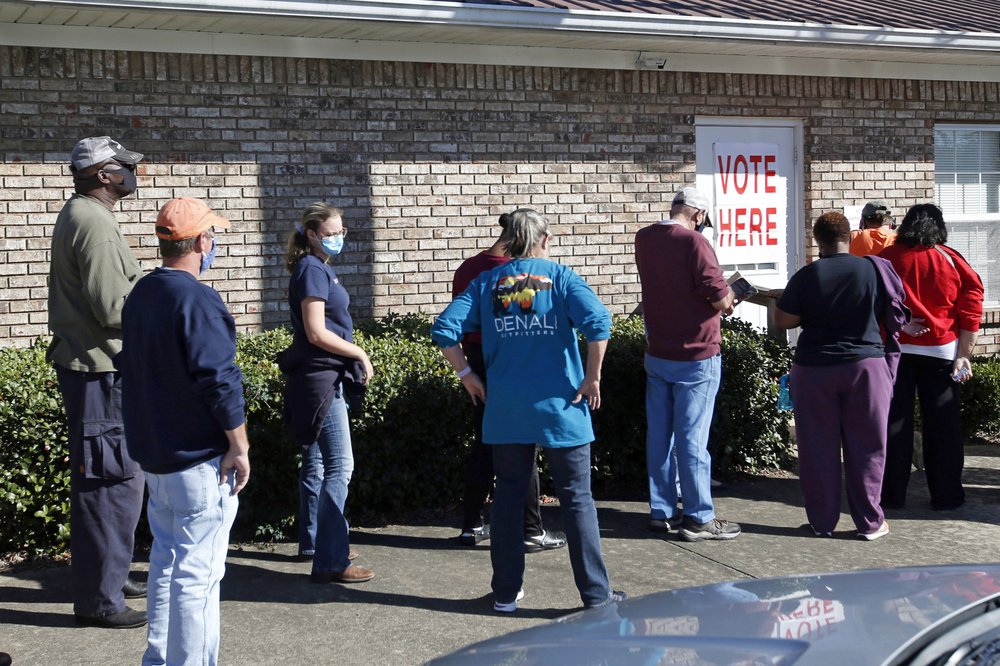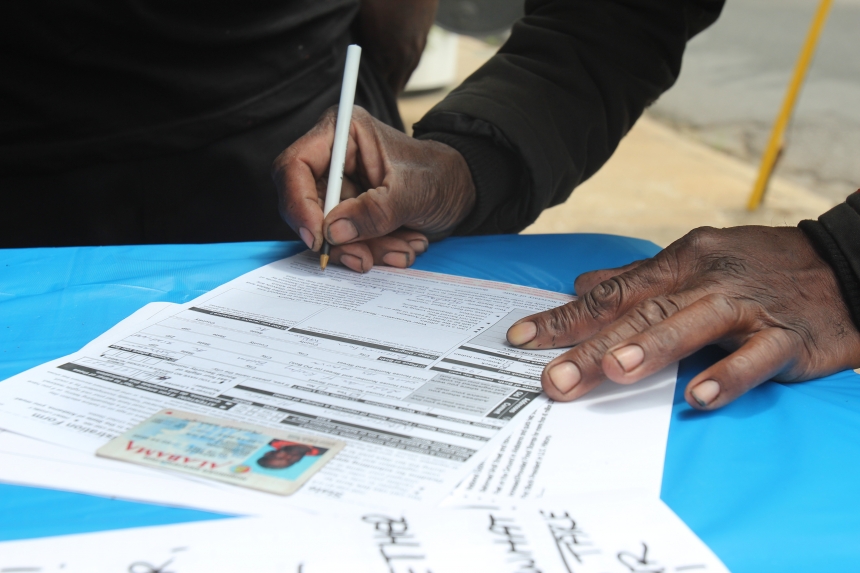Two Alabama judges tapped to serve on election council

Secretary of State John Merrill announced that two Alabamians had been named to the U.S. Election Assistance Commission’s Local Leadership Council (LLC). James Tatum, Probate Judge of Bullock County, and Andrea LeCroy, Probate Judge of Marshall County, will serve as Alabama’s representatives on the LLC. The LLC is a federal advisory board that will focus almost exclusively on the responsibilities of local election officials. The council will consist of two members from each state to ensure geographic diversity, objectivity, and balance. According to the U.S. Election Assistance Commission (EAC) website, the EAC established the Local Leadership Council on June 8, 2021. The board is comprised up of 100 local election officials who are current or former officers in each state’s local election official association. The advisory board gives recommendations to the EAC on topics like voter registration and voter list maintenance, voting system user practices, ballot administration, processing, accounting, canvassing, auditing and testing of ballots, and certification of results.
Election survey results in; Alabamians overwhelmingly vote in person

The Secretary of State’s office today released the results of the Election Assistance Commission’s (EAC) Election Administration and Voting Survey (EAVS). According to their website, the EAC has sponsored these surveys since 2004 as a way to collect information on the state of American elections. The information helps to educate policy-makers, advocates, scholars, journalists, and the general public. The EAC uses EAVS data to “create research and clearinghouse resources to advance the agency’s mission and to better support election officials and voters as well as to inform lawmakers and national-level stakeholders about the impact of federal voting law.” In the 2020 General Election, Alabama reported a 67.7% turnout rate among registered voters and a 62.4% turnout rate for eligible Alabamians over 18, per Census data. Alabama reported a 12.9% turnout by mail, and 92.8% of mailed ballots were returned. However, Alabama led the nation with the highest in-person voting percentage of ballots cast on Election Day at 86.5% The press release explained that results show that Alabamians overwhelmingly preferred to vote in-person on Election Day, but the results also show that Alabamians who chose to vote absentee were provided a secure and accessible process.
Judge OKs Alabama voter registration rules for now

Residents of Kansas, Georgia and Alabama will have to prove they are U.S. citizens when registering to vote for federal elections using a national form, a judge ruled Wednesday. U.S. District Judge Richard Leon sided against a coalition of voting rights groups that sued a U.S. elections official who changed the proof-of-citizenship requirements on the federal registration form at the request of the three states and without public notice. Residents of other states only need to swear that they are citizens, not show proof. The judge refused to issue a temporary injunction sought by voting rights advocates to overturn the move by Brian Newby, the executive director of the U.S. Election Assistance Commission, until the case can be decided on its merits at trial. No trial date has been set yet, but lawyers for the voting rights groups have previously indicated that if their request was denied, they’d file an appeal before the November elections. Newby took the top job in November at a government agency entrusted with making voting more accessible, and then months later used the federal position to implement the obstacle to voter registration in three states. Fewer than 1 percent of voters in Kansas use the federal form to register. Alabama and Georgia are not currently enforcing their proof-of-citizenship laws. The judge called the breadth of the preliminary injunction that was sought “truly astonishing,” saying the groups are asking the court to void Newby’s actions, order the EAC to reverse the changes he made to the federal form and withdraw Newby’s letters granting the states’ requests. “These demands are dramatized all the more by the fact the United States Department of Justice has somehow decided to consent to such remarkable relief!” Leon wrote. He also called it “a thinly veiled request” for what’s normally accorded in a final judgment. “While we are disappointed in today’s decision, we will appeal to protect the critical rights of voters in these three states, especially during this election year,” said Chris Carson, president of the League of Women Voters of the United States. Kansas Secretary of State Kris Kobach, who intervened in the lawsuit on Newby’s behalf, did not immediately respond to an email or phone messages. The U.S. Supreme Court has said that states must accept and use the federal voter registration form, and an appeals court ruled in 2014 in a lawsuit filed by Kobach that states could not force the commission to require residents to provide proof-of-citizenship documents on the national form. “Despite this setback, we are confident in the strength of our case,” said Wendy Weiser, director of the Brennan Center’s Democracy Program. The government has already conceded in an earlier court filing that Newby and his agency likely cannot win the lawsuit on its merits because Newby never determined, as required by the National Voter Registration Act, that the documents were “necessary” to determine the eligibility of voters. The government noted that Congress considered and specifically rejected requiring proof-of-citizenship documents when registering to vote. Leon said that “what lies at the heart of this case are the scope of the authority and the legality of the actions of an independent federal agency that is represented here by Executive Branch counsel who, for the most part, decline to defend it.” Newby contends he had the administrative authority to grant the request from the three states to add the documentary proof of citizenship requirements on the federal registration form used for their residents. But voting rights advocates were stunned by Newby’s February action, saying it flies in the face of the commission’s mission to provide a simple, easy form to encourage voter registration. The groups argue the proof-of-citizenship requirements hurt their ability to conduct voter registration drives and deprive eligible voters of the right to vote in federal elections. The little-known commission was created in 2002 to help prevent a repeat of the disputed 2000 presidential election between George W. Bush and Al Gore following voting chaos in the crucial state of Florida. Among the commission’s duties is oversight of the national voter registration form. The federal body is supposed to have two Republican and two Democratic commissioners but has only one Democrat now because of a vacancy. Newby is a former Kansas election official who was appointed to his state job by Kobach. As a Kansas official, Newby had publicly supported the state’s efforts to modify the federal form. Republished with permission of The Associated Press.
State residents must now provide proof of citizenship to register to vote

A federal elections official has decided — without public notice or review from his agency’s commissioners — that residents of Alabama, Kansas and Georgia can no longer register to vote using a federal form without providing proof of U.S. citizenship. The action by the new executive director of the U.S. Election Assistance Commission is being roundly criticized by voting rights activists, who say the “secretive move” will create additional barriers for potential voters, and one of the agency’s own commissioners, who says it contradicts policy and precedent. The new instructions were posted on the agency’s website, according to EAC’s executive director Brian Newby, who sent letters dated Jan. 29 to the three states that had requested the change. Under the new rule, any resident in those states who registers to vote using the federal form must show citizenship documentation — such as a birth certificate, naturalization papers or passport. In other states, no such documentation is needed to register; voters need only sign a sworn statement. The changes took effect immediately, Newby said, adding that any interested party could request a review from the commission, which is appointed by the president and confirmed by the Senate. That review may very well happen. EAC Commissioner Thomas Hicks, told The Associated Press that he’s weighing his options so that the commissioners can address the issue. The Democrat posted a blistering statement on the agency’s website this week, and said Thursday that Newby’s action constitutes a policy change that should have been taken up by the commission and approved by at least three of four commissioners. Currently, there are three sitting members and a vacancy to be filled. “I guess it is in effect, but I don’t want it to be in effect,” he said. The other commissioners, both Republicans, did not immediately respond to requests for comment. Newby took over in November and came from Kansas, whose Republican secretary of state, Kris Kobach, has been a staunch advocate for such citizenship requirements and has fought court battles over them. Kobach also had appointed Newby to be a county elections commissioner. Newby defended his decision as a routine administrative action, insisting it was within his authority and that he didn’t look at the decision to add state-specific instructions in the context of the citizenship issue. “I don’t think there is any discretion that I am given to make a determination on which instructions submitted are OK and which ones aren’t,” Newby said. “And that is the rub here.” Newby said the move was prompted by a Nov. 17 letter from Kobach’s office requesting the addition of the citizenship documentation requirements to the federal form, and he looked at similar pending requests from Georgia and Alabama. Hicks acknowledged that the commission was aware Newby was reviewing the requests, but wrote earlier this week that it had “addressed this matter several times over the last decade and voted to decline requests to add conflicting language to the voter registration form.” The American Civil Liberties Union of Kansas, which has fought Kobach in the courts over voting rights, echoed Hicks. “We think this is neither appropriate, nor legal — not to mention simply bad policy,” ACLU executive director Micah Kubic said. “There is a reason EAC has held the position that it did for so many years, which is that there should be one standardized federal form.” Kubic also said that the EAC’s executive director should be someone who believes in extending and guaranteeing the right to vote — not creating hindrances. “The way this was done in secret, unilaterally, without consultation, without public review and comment, without any of the normal processes and procedures that would be used for a dramatic change in policy like this, makes it all the more shocking and brazen and wrong,” Kubic said. Kansas already had moved ahead with a dual voter-registration system, banning those who registered through the federal form from voting in state and local races. A state court recently ruled Kobach did not have the legislative authority to create such a dual system, but Kobach said Thursday that it’s now a moot point. Alabama was waiting for EAC guidance to implement a proof-of-citizenship requirement because of questions of authority, state Elections Director Ed Packard said Thursday. He noted that it’s unclear how soon the new rule will be implemented, or what effect it might have. “It’s really hard to predict whether there will be any dramatic or noticeable impact in terms of voter registration,” he said. “Certainly we don’t see it as something that’s going to increase the rate of registration … Obviously there’s gonna have to be a public relations campaign to get the word out because people are not used to having to show proof of citizenship to register to vote.” Georgia hasn’t implemented proof-of-citizenship requirements, and has put no restrictions on voters who register through federal forms, said David Dove, a spokesman for Georgia Secretary of State Brian Kemp. Republished with permission of the Associated Press.


